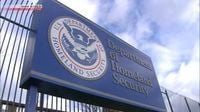The Trump administration has introduced a controversial new program aimed at illegal immigrants, offering a $1,000 stipend and travel assistance for those who choose to voluntarily "self-deport" from the United States. Announced on May 5, 2025, by the Department of Homeland Security (DHS), this initiative is part of a broader strategy to expedite deportations and reduce costs associated with the deportation process.
According to the DHS, the stipend and potential airfare for migrants who opt for this self-deportation route will be significantly cheaper than traditional deportation methods. Currently, the average cost of arresting, detaining, and deporting an individual without legal status is around $17,000. By encouraging voluntary departures, the administration claims it could cut these costs by approximately 70 percent.
Homeland Security Secretary Kristi Noem emphasized the benefits of the program, stating, "If you are here illegally, self-deportation is the best, safest, and most cost-effective way to leave the United States to avoid arrest." This initiative also includes the use of a rebranded app, CBP Home, previously known as CBP One, which was originally introduced under the Biden administration to facilitate legal entry into the U.S. Now, the app is being repurposed to assist migrants in confirming their return to their home countries.
Upon confirming their return through the app, migrants will receive the $1,000 stipend. The DHS noted that this approach may help preserve the possibility for these individuals to return to the U.S. legally in the future, although no specific pathways or programs were detailed.
Despite the administration's optimistic outlook on the program, it has faced criticism from immigrant advocacy groups. Make the Road New York, a prominent immigrant rights organization, condemned the stipend initiative. Natalia Aristizabal, the group’s deputy director, described the program as "cruel" and "misleading," pointing out the numerous barriers migrants face when attempting to return to the U.S. legally.
President Trump, who took office in January 2025 with a pledge to deport millions of undocumented immigrants, has seen lower deportation numbers compared to his predecessor, Joe Biden. Since January 20, 2025, the Trump administration has deported approximately 152,000 individuals, a figure that lags behind the 195,000 deportations recorded during a similar timeframe under Biden from February to April 2024.
In addressing the new program, Trump told reporters, "They can come back in if they're good people, if they're the kind of people that we want in our company, industries, people that could love our country." He further warned that those who do not leave voluntarily would face removal from the country and would not be allowed a path to return.
This latest effort marks a significant shift in the Trump administration's approach to immigration, particularly as it seeks to balance the costs associated with deportation against the political imperative of enforcing strict immigration policies. The administration's focus on self-deportation, coupled with financial incentives, reflects a strategy aimed at reducing the burden on the immigration enforcement system while appealing to Trump's base, which has consistently advocated for tougher immigration measures.
As the program unfolds, it remains to be seen how many migrants will take advantage of the offer and whether it will effectively reduce the number of undocumented individuals in the U.S. The DHS's initiative is a clear indication of the administration's intent to reshape immigration policy, prioritizing voluntary departures while attempting to mitigate the financial implications of deportation.
While the self-deportation program may offer immediate financial relief for some migrants, the long-term implications of such a policy raise questions about its effectiveness and fairness. Advocates for immigrants continue to voice concerns about the potential for coercion and the lack of comprehensive support for those who choose to leave.
In summary, the Trump administration's new self-deportation program introduces a financial incentive for illegal immigrants to leave the U.S. voluntarily, aiming to reduce deportation costs significantly. However, the initiative has drawn criticism from advocates who argue that it fails to address the complex realities faced by migrants seeking to return legally. As the political landscape evolves and immigration remains a hot-button issue, the success of this program will likely be scrutinized closely by both supporters and detractors alike.

